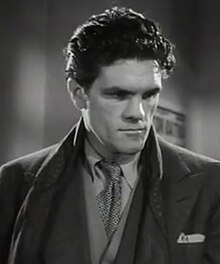Freddie Mills
| Freddie Mills | |
|---|---|

Freddie Mills in the 1952 film The Hundred Hour Hunt
|
|
| Statistics | |
| Real name | Frederick Percival Mills |
| Nickname(s) | Fearless Freddie |
| Rated at | Light-heavyweight |
| Height | 5 ft 10 1⁄2 in (179 cm) |
| Reach | 72 in (183 cm) |
| Nationality | British |
| Born |
26 June 1919 Bournemouth, Hampshire, England, UK |
| Died | 25 July 1965 (aged 46) London, England, UK |
| Stance | Orthodox |
| Boxing record | |
| Total fights | 101 |
| Wins | 76 |
| Wins by KO | 49 |
| Losses | 18 |
| Draws | 7 |
| No contests | 0 |
Frederick Percival "Freddie" Mills (26 June 1919 – 25 July 1965) was an English boxer, and the world light heavyweight champion from 1948 to 1950. He was born in Bournemouth, Hampshire. Mills was 5 feet 10 1⁄2 inches (179 cm) tall and did not have a sophisticated boxing style; he relied on two-fisted aggression, relentless pressure, and the ability to take punishment to carry him through, and in more cases than not these attributes were sufficient. Mills excelled as a light-heavyweight boxer, but occasionally fought as a heavyweight. He was described as Britain's biggest boxing idol in the post-war period.
After retiring from Boxing, Mills took up acting and played character roles in a number of films and was a presenter on the early BBC TV music show, Six-Five Special (1957), and also ran a successful nightclub until his mysterious death.
He was born Frederick Percival Mills in Bournemouth, Hampshire, and was the youngest of four children of Thomas James Mills, a totter and marine store dealer, and his wife Lottie Hilda Gray. He received a pair of boxing gloves when he was eleven, and he used to spar with his brother Charlie. He attended St Michael's School in Bournemouth until the age of fourteen, and then became an apprentice milkman.
Mills began fighting in fairground booths and at venues on the south coast. He had his first official boxing match on 26 February 1936 at the local ice rink (aged 16), and won by a knockout in the first round. His first 64 fights, in 3½ years, against minor light-heavyweights resulted in 48 wins, 9 losses and 7 draws. He then stepped up in class to fight Jock McAvoy, the British and Commonwealth middleweight champion, who had, the previous year, unsuccessfully fought Len Harvey for the British and Commonwealth light-heavyweight titles. The fight against McAvoy took place in Liverpool in August 1940 and Mills won a clear decision over ten rounds.
During the rest of 1940 and 1941, Mills continued to fight. In December 1941, he fought Jack London, a heavyweight who was later (in 1944) to win the British and Commonwealth heavyweight titles. Mills won on points over ten rounds.
...
Wikipedia
